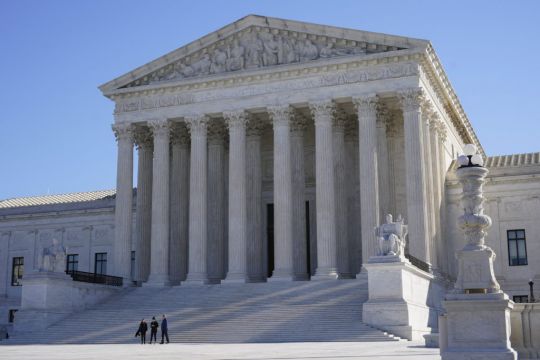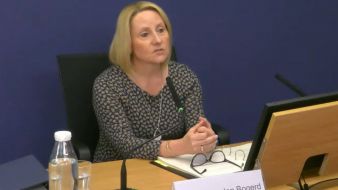The US Supreme Court engaged in spirited arguments on Monday in a major case pitting LGBT rights against a claim that the constitutional right to free speech exempts artists from anti-discrimination laws - a dispute involving an evangelical Christian web designer who refuses to provide her services for same-sex marriages.
The justices were hearing Denver-area business owner Lorie Smith's appeal seeking an exemption from a Colorado law that bars discrimination based on sexual orientation and other factors. Lower courts ruled in favour of Colorado.
Smith, who runs a web design business called 303 Creative, contends that Colorado's Anti-Discrimination Act violates the right of artists - including web designers - to free speech under the US Constitution's First Amendment by forcing them to express messages through their work that they oppose.
Smith (38) has said she believes marriage should be limited to opposite-sex couples. She preemptively sued Colorado's civil rights commission and other state officials in 2016 because she feared she would be punished for refusing to serve gay weddings.
Liberal justices posed a series of tough questions to Kristen Waggonner, the lawyer representing Smith.
Justice Sonia Sotomayor said a ruling in favour of Smith could open the door to allow an individual in Smith's position to also decline to provide services if they objected to interracial marriages or disabled people getting married.
"Where's the line?" Sotomayor asked.
Waggonner depicted the case as a fight against government-compelled speech, describing her client as an artist creating a custom creation rather than merely a service. Waggonner said Colorado law forces Smith "to create speech not simply sell it".
Waggonner said that Smith "believes opposite-sex marriage honours scripture and same-sex marriage contradicts it".
"If the government can label this speech equivalent, it can do so for any speech, whether religious or political. Under Colorado's theory, jurisdictions could force a Democrat publicist to write a Republican's press release."
Colorado, civil rights groups and numerous legal scholars have said that endorsing Smith's free speech arguments could lead to widespread discrimination against LGBT people and others.
'Mike and Harry'
Liberal Justice Elena Kagan questioned why a website designer who provided a heterosexual couple a standard wedding website with names, dates, pictures and hotel information could decline to provide the exact same site to a gay couple.
"If I understand you, you're saying, 'Yes, she can refuse,' because there's ideology just in the fact that it's Mike and Harry, and there's a picture of these two guys together," Kagan said.
The case follows the Supreme Court's narrow 2018 ruling in favour of Jack Phillips, a Christian Denver-area baker who refused on religious grounds to make a wedding cake for a gay couple. The court in that case stopped short of carving out a free speech exemption to anti-discrimination laws.
Like Phillips, Smith is represented by attorneys from the Alliance Defending Freedom, a conservative religious rights group. The Supreme Court did not take up one aspect of her challenge to Colorado law based on religious rights also protected by the First Amendment, focusing on free speech instead.
Public accommodations laws exist in many states, banning discrimination in areas such as housing, hotels, retail businesses, restaurants and educational institutions.
Colorado first enacted one in 1885. Its current law bars businesses open to the public from denying goods or services to people because of race, gender, sexual orientation, religion and certain other characteristics, and from displaying a notice to that effect.
Conservative Justice Amy Coney Barrett said Waggoner was on her "strongest ground when you're talking about her sitting down and designing and coming up with the graphics to customize them for the couple." But Barrett questioned whether the First Amendment would still protect Smith if she wanted to decline to provide a "plug-and-play" website to a gay couple that an opposite sex couple could buy.
Conservative Justice Brett Kavanaugh said the case comes down to a "fairly narrow question of how do you characterise website designers," whether they are more like restaurants or publishing houses.
"So if you win this case, and if you prevail here, the next case involves a caterer - at least your position here is that would be different?" Kavanaugh asked Waggonner.
A caterer would be different from a web designer, Waggonner said.
Similar legal fights involving other small business including a wedding photographer and a calligrapher owners have been waged in other states.
The Supreme Court, with its 6-3 conservative majority, has become increasingly supportive of religious rights and related free speech claims in recent years even as it has backed LGBT rights in other cases. The court legalised gay marriage nationwide in a landmark 2015 decision and in 2020 expanded protections for LGBT workers under federal law.
A ruling in Smith's case is expected by the end of June. -Reuters







